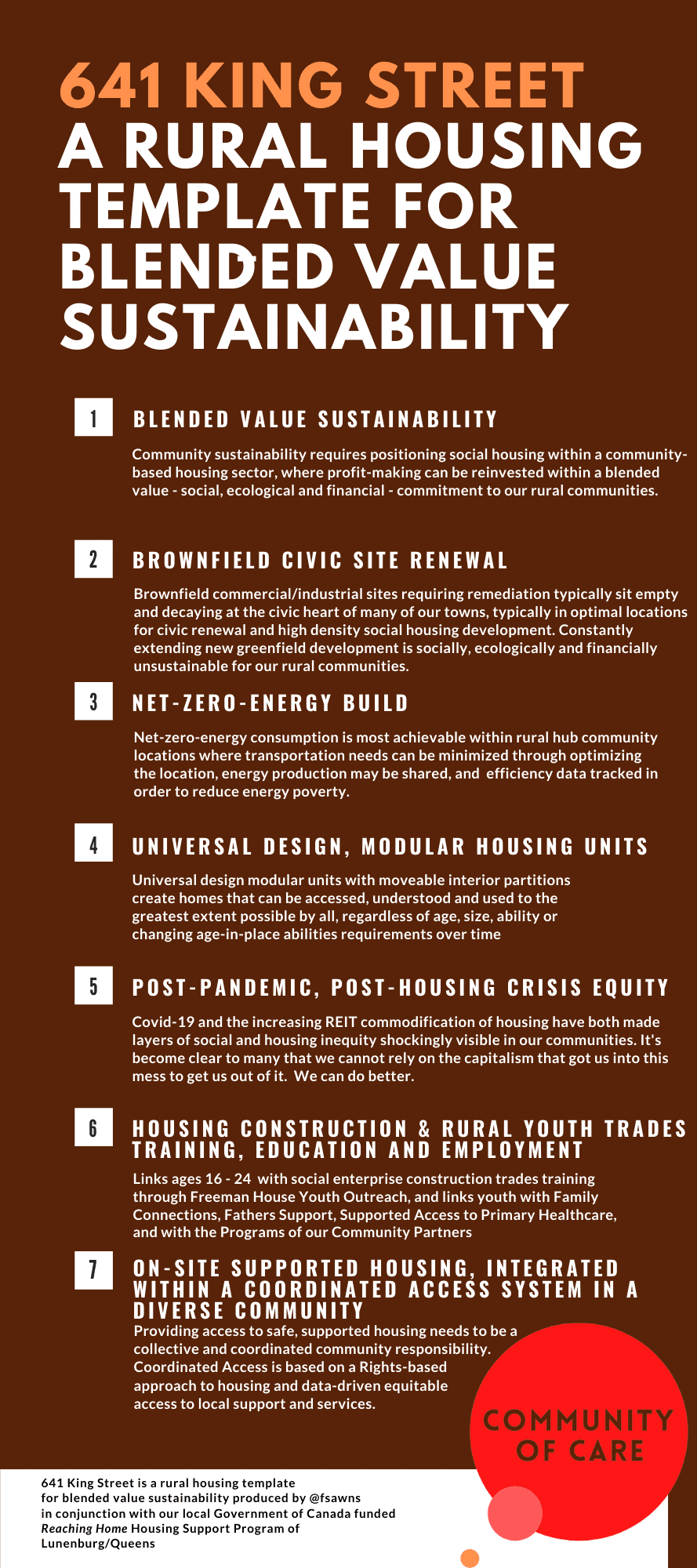KJIPUKTUK (Halifax) – Art Fisher is the executive director of the non-profit Family Service Association of Western Nova Scotia. On Tuesday he appeared in front of a virtual Standing Committee of Community Services to speak about affordable housing and COVID-19, along with an assortment of senior bureaucrats of the departments of Community Services and Infrastructure and Housing.
In his introductory comments Fisher talked about the damage done to rural communities by developers solely focused on profits, and the myth that affordable housing can only be done well by commercial developers supported by government funding.
You can read more about the excellent work of the organization in this morning’s profile of Fisher and his work by CBC reporter Jean Laroche.
In terms of data, where we are now with Lunenburg, Queens County, under the Reaching Home federally funded housing support program, we had posted on social media a couple of weeks ago that we had 53 youths between the ages of 12 and 24 who were either unhoused or at imminent risk of eviction. That’s up to 61 today. Also, as of yesterday, we have 107 adults in the same situation.
We’ve heard lots of talk about all the inequities that COVID-19 has rendered visible. I think ultimately what COVID-19 renders visible, is the huge extraction of wealth from particularly rural Nova Scotia and all of our communities that are struggling. I don’t think the real estate phenomenon is actually a phenomenon, I feel it’s a deliberate extraction of wealth from our communities.
That extraction of wealth certainly ramped up in our area over the last years, as developers bought buildings, and are really only interested in buying the building and securing the land, and creating profitability for investors. At one point in that first year when those buildings started being bought up, one of our housing support workers came to me crying because she said every person I housed over the last 12 months has just been evicted. So I think that it’s really important to consider what the actual problems are.
I’ve gone to a lot of meetings this year where I hear success stories. I’m getting more and more and more and more frustrated by the success stories, because the success stories often don’t show us where the gaps are, they don’t show us where our systems are failing people. What the success stories do is often make us as workers feel better.
For example, I’ve gone to lots of community sector success story meetings where we’re supposed to feel successful, because we’ve given a $20 gift card to youth. We’ve also sometimes been warned to make sure that that youth doesn’t get more than one 20 dollar gift card. Quite frankly, I think there’s a huge disconnect between what our department funders are doing, and what our community is experiencing. I mean, people are not going to get multiple $20 gift cards because they’re manipulative, which is often what the department thinks. People are going to (try to) get multiple $20 gift cards because they’re scrambling to survive.
It’s really important to be clear about what the problems are. There are multiple myths that are important to look at. I think one of the myths is that the housing crisis is simply a phenomenon. It’s not, it’s an extraction of wealth from our communities all across North America, all across the globe. We need to be very attentive to the implications of that extraction of wealth.
What that (extraction of wealth) is doing is that it’s actually taking all the resources from our rural communities that we could be using to build those communities. Ultimately, the issue is not poverty, or some people living in poverty. The issue is the extraction of wealth that’s creating the poverty.
Another myth is that community-based, supported and affordable housing is not profitable. And I think that’s a myth that actually permits the extraction of wealth by developers to continue. For example, in our first project to create supportive affordable housing, we insulated the building at 629 King Street to passive solar standards. That’s really all we did, and we put in heat pumps. That alone means that residents are paying $45 a month in the middle of the winter, to heat their apartment. In our next project we want to move to net zero. Because we think that it’s really important to move to net zero energy to make these projects diverse and profitable.
Another issue that we’re not dealing with is the fact that many of the rural youth agencies could benefit greatly from being linked with trades education and employment. That could help them be a part of building a community-based affordable housing sector. The average age I think of construction workers in Nova Scotia right now is 48. We drastically need the youth. So the very youth that on the one hand we call manipulators, on the other hand we badly need those youth to help build our future.

Check out our new community calendar!
With a special thanks to our generous donors who make publication of the Nova Scotia Advocate possible.
Subscribe to the Nova Scotia Advocate weekly digest and never miss an article again. It’s free!




I,ve lived in Halifax since the early 80,s. Wages here wer low,however house prices were attainable,however I seen a few increases over the years in increments. I bought a house in the later 90,s , didnt like the area ,so tried to sell to get into a better area,and due to lack of interest, even in a sellers market, lost out on a place i had interest in and eventually sold the house in 2005. In 2000 the house prices rose close to 100,000 for a new house,however you could buy a new place for 200k,which was still reasonable, however out of reach for me at the time. I rented up to now,and Im now in the market for a new home,where i have savings to purchase approx 200k-300k area,however The amount of buyers relative to houses available,is 100/1,or seeems to be that way. The governments are funding trade centers, that run millions over budjet,and people are literally out on the street,or going more and more in debt. The younger generations around here have no future. wages are still not great and how can you expect people to work ,only to pay rent. Especially the medial jobs, which are minimum wage. You,ll never own a house in nova scotia with minimum wage earnings,so why would people stay, or move here..You,ll struggle to get people to work at anything ,especially the grocery store jobs,ect,, and when that happens, it will be a reality check for Nova Scotia